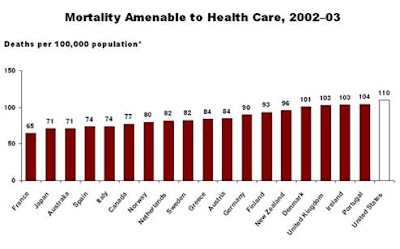And what is it about Obama that makes it impossible for him to reassure Reagan Democrats, whatever he says, whatever he does, and whatever positions he holds? Ferraro says this: "They don't identify with someone who has gone to Columbia and Harvard Law School and is married to a Princeton-Harvard Law graduate." But that can't be right: surely Reagan Democrats don't have such a finely-grained view of the distinctions* between Ivy League law schools that while Obama qualifies as an elitist, someone who went to Wellesley and Yale Law School and is married to a Georgetown-Yale Law grad counts as the salt of the earth.
It's very hard to avoid the conclusion that Obama cannot reach the Reagan Democrats in Geraldine Ferraro's head, that they don't think he will treat them fairly or understand them or their problems, because he is black.
Ferraro's Reagan Democrats, whoever they are, are either easily manipulated simpletons who vote against their own interests or racist fucks. Either way, her seeming empathy with them is disturbing.
2. In other news, the Democratic bigwigs are meeting today to decide the fate of Florida and Michigan's delegations. Any "compromise" will be grossly unfair not only to Obama but also to the millions of Democrats who were told their votes would not count, and thus did not vote.
But it looks like they'll just cut the total delegates in half and give Obama most if not all of Michigan's "uncommitted". TPM reports that the Obama campaign is already supporting a deal for Florida that will net Hillary 19 delegates, but they want to just split Michigan 50-50. Works for me, if it finally ends this primary.
UPDATE: From Daily Kos:
Hee.I think for 2012, Californians should unilaterally decide that our state will be worth 5,000 delegates. Sure, it'd be against one piffling party rule, but I fail to see why the voters of California should be disenfranchised by not seating them all.
We're a democracy, so not seating them would be like enabling Hitler.
Also, our delegates will have the power of tagsies, which means that if they touch a delegate from another state while shouting "I AM THE HIGHLANDER", that other delegate has to give them their lunch money. Deal with that, Rules Committee.
3. Finally, I did indeed see the new Indiana Jones last weekend, and I just realized that I have not yet posted a review. I enjoyed it, but it was not the same quality as the originals. It was marred by too much CG, too much implausible and silly action (even for this series), and weak use of Karen Allen's character. Harrison Ford is still good in the role, and Shia LeBeouf wasn't too irritating, but 19 years on, it's time to put Indy to bed.












